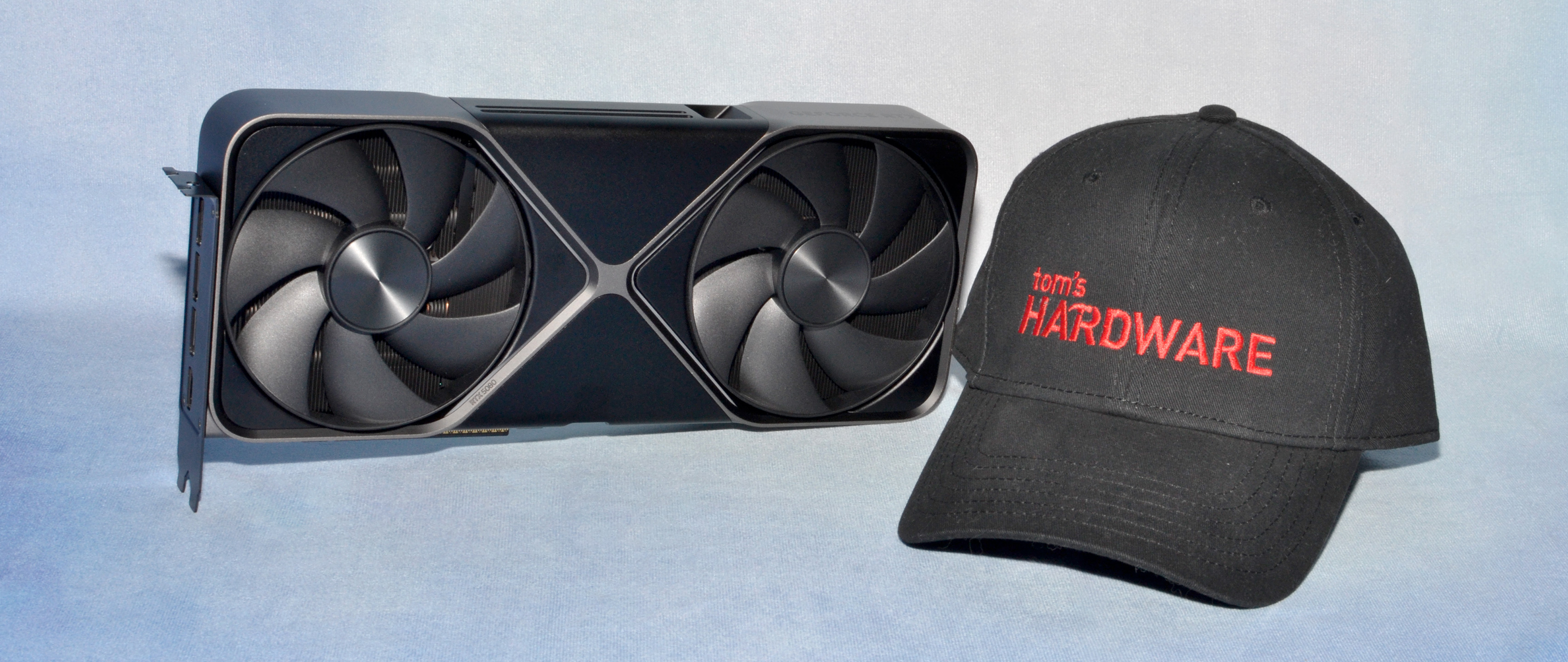Why you can trust Tom's Hardware
Nvidia RTX 5080: Content Creation, Professional Apps, and AI
Modern GPUs aren't just about gaming. They're used for video encoding and professional applications, and increasingly, they're being used for AI. We've revamped our professional and AI test suite to give a more detailed look at the various GPUs. We'll start with the AI benchmarks, as those tend to be more important for a wider range of users.
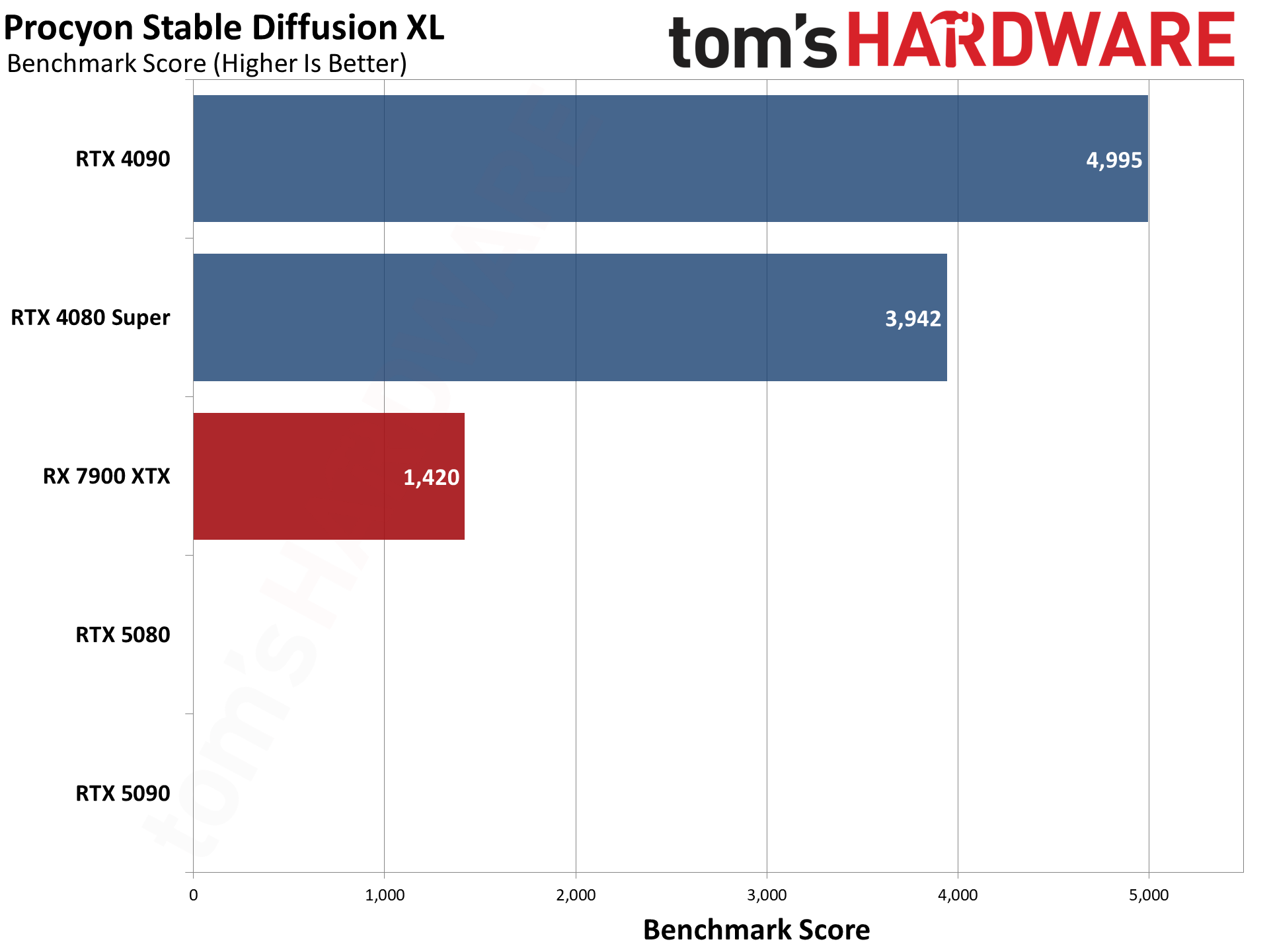
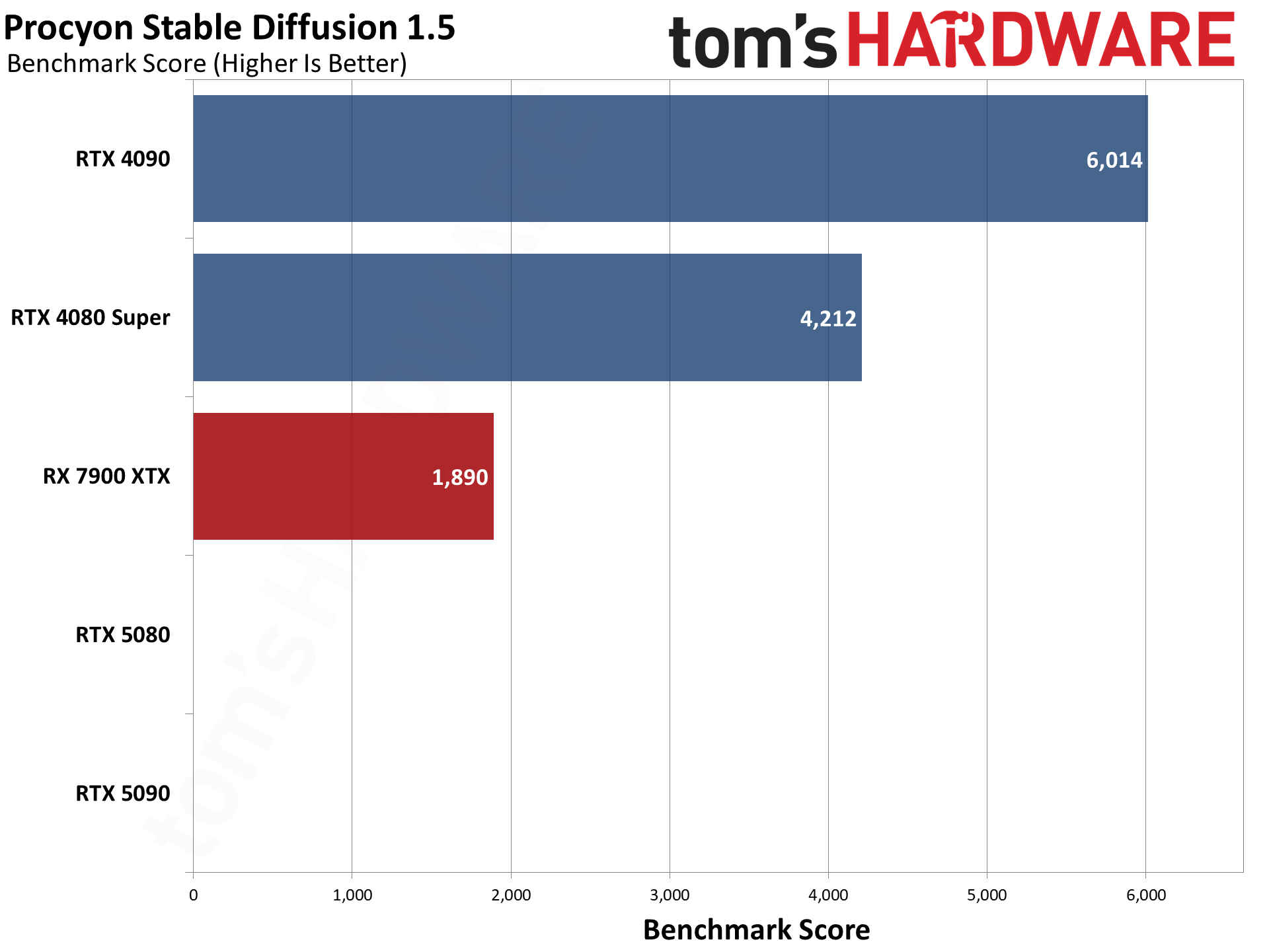
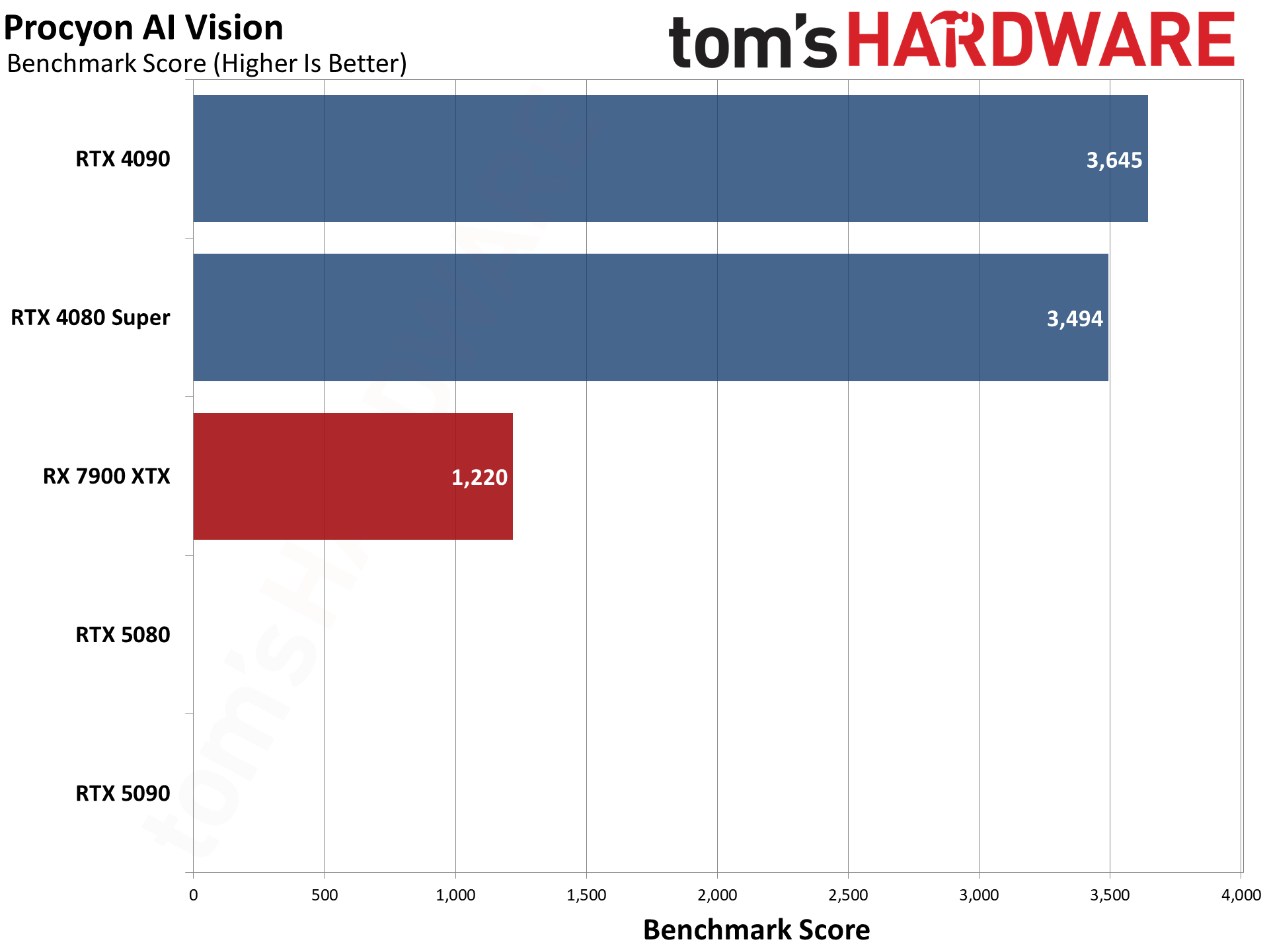
Procyon has several different AI tests, and we've run the AI Vision benchmark along with two different Stable Diffusion image generation tests. The tests have several variants available that are all determined to be roughly equivalent by UL: OpenVINO (Intel), TensorRT (Nvidia), and DirectML (for everything, but mostly AMD). There are also options for FP32, FP16, and INT8 data types, which can give different results. We tested the available options and used the best result for each GPU.
Procyon needs to be updated to work on the RTX 50-series GPUs, so for now,, we'll skip commenting on these tests. The 5080 and 5090 fail to run any of the TensorRT workloads we've tried. Nvidia is aware of the problem, but we're not sure how long it will take for a fix to become available.
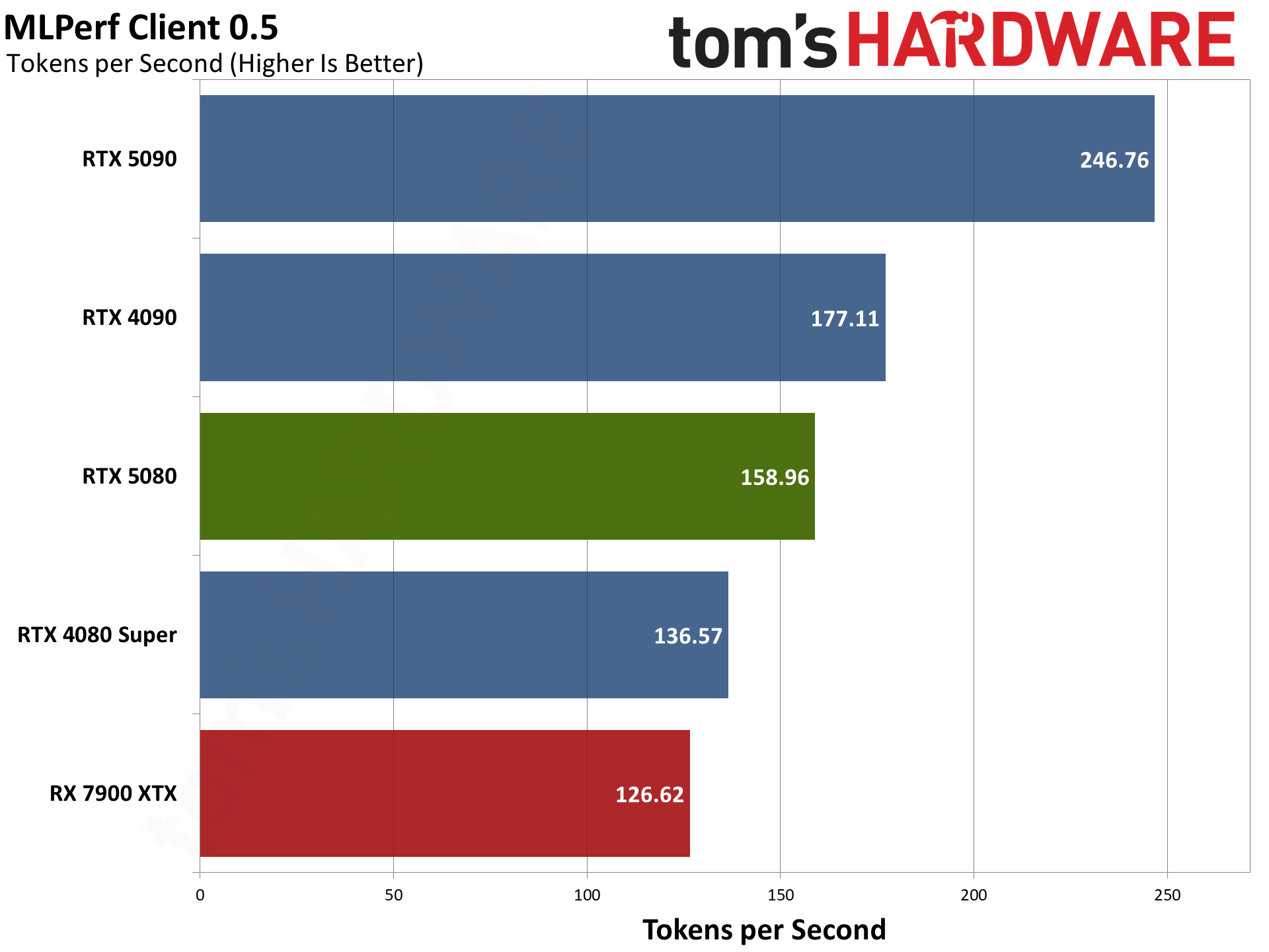
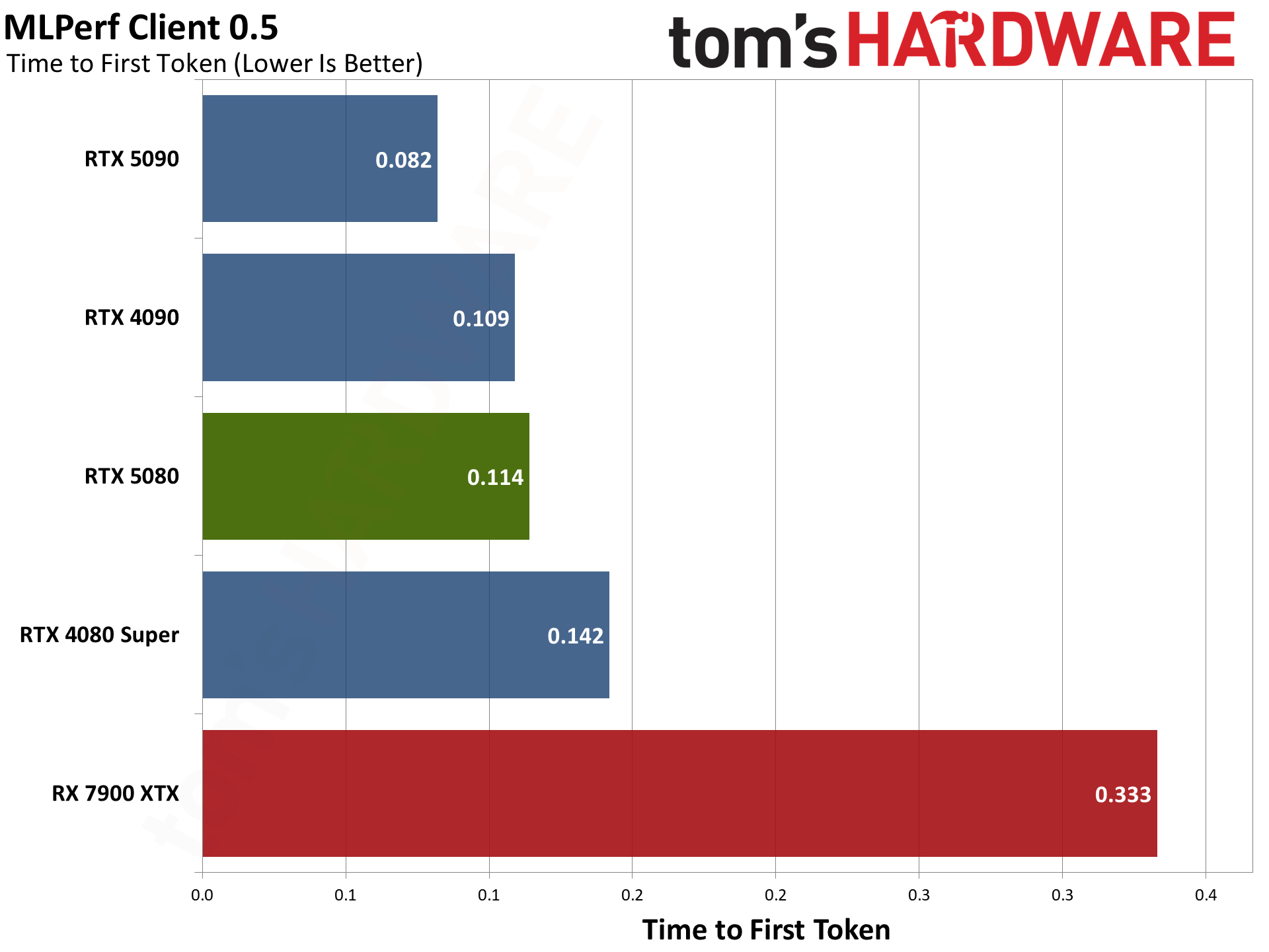
ML Commons' MLPerf Client 0.5 test suite does AI text generation in response to a variety of inputs. There are four different tests, all using the LLaMa 2 7B model, and the benchmark measures the time to first token (how fast a response starts appearing) and the tokens per second after the first token. These are combined using a geometric mean for the overall scores, which we report here.
While AMD, Intel, and Nvidia are all ML Commons partners and were involved with creating and validating the benchmark, it doesn't seem to be quite as vendor-agnostic as we would like. AMD and Nvidia GPUs only have a DirectML execution path, while Intel has both DirectML and OpenVINO as options. Intel's Arc GPUs score quite a bit higher with OpenVINO than with DirectML.
The RTX 5080 delivers a good result here. It's not quite as fast as the RTX 4090, but it's 16% faster than the 4080 Super. Basically, the delta is on the higher end of what we saw in our gaming benchmarks. The additional memory bandwidth on the 5080 is the primary factor, as MLPerf isn't using FP4 for these tests.
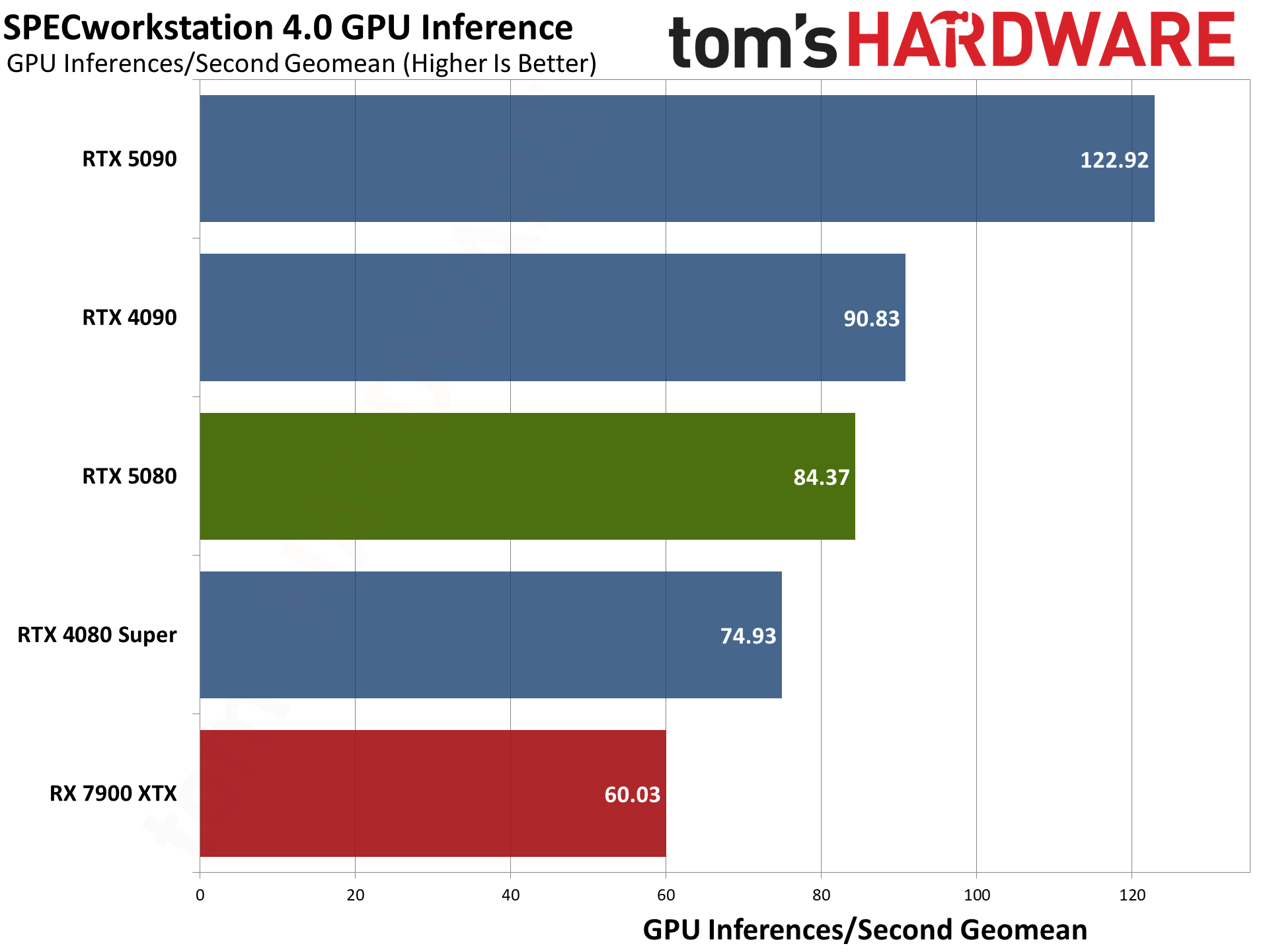
We'll have some additional SPECworkstation 4.0 results below, but there's an AI inference test composed of ResNet50 and SuperResolution workloads that runs on GPUs (and potentially NPUs, though we haven't tested that). We calculate the geometric mean of the four results given in inferences per second, which isn't an official SPEC score but it's more useful for our purposes.
The RTX 5080 ends up 13% faster than the RTX 4080 Super in this test. It's still slower than the 4090, though, which is expected.
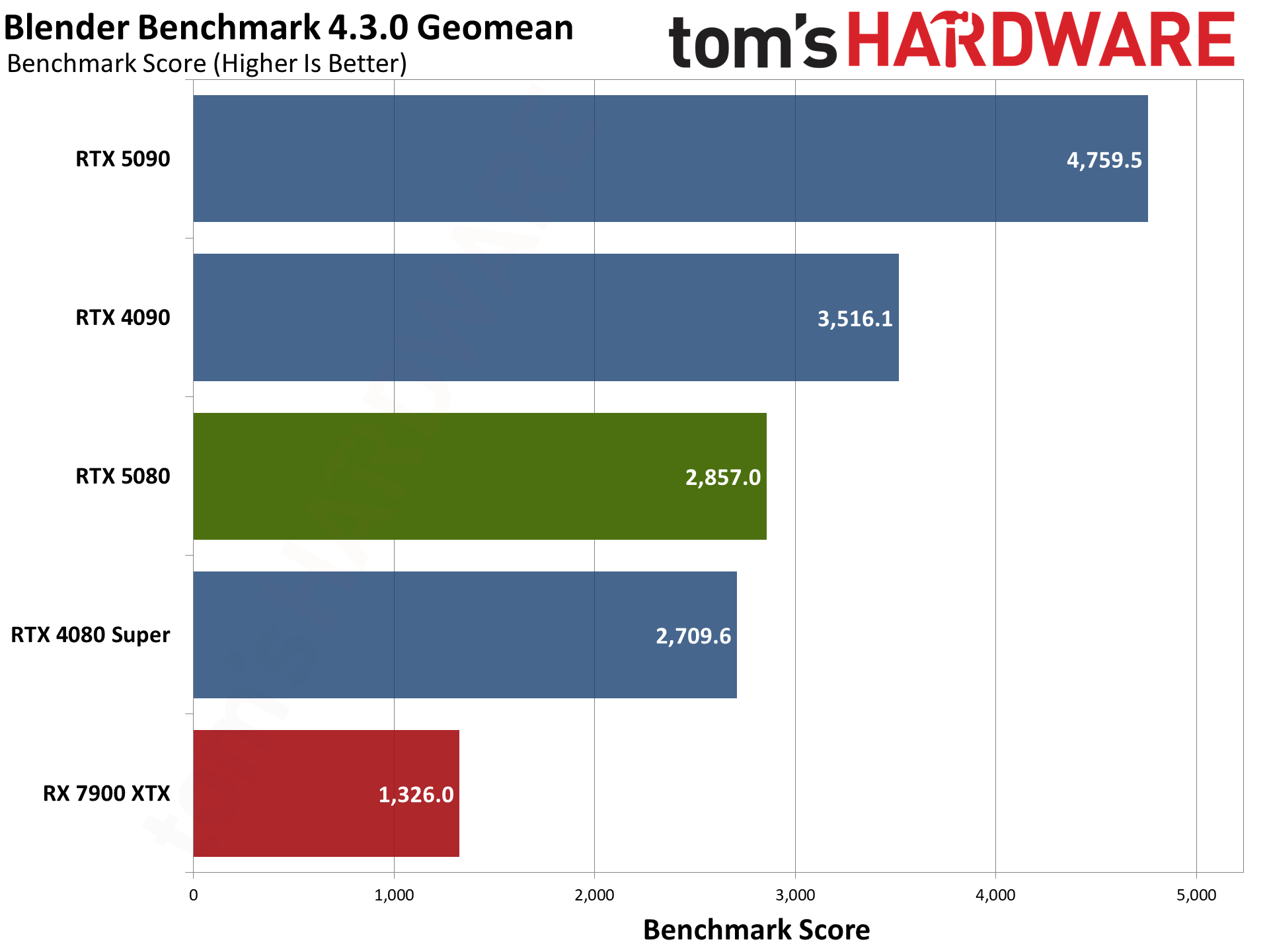
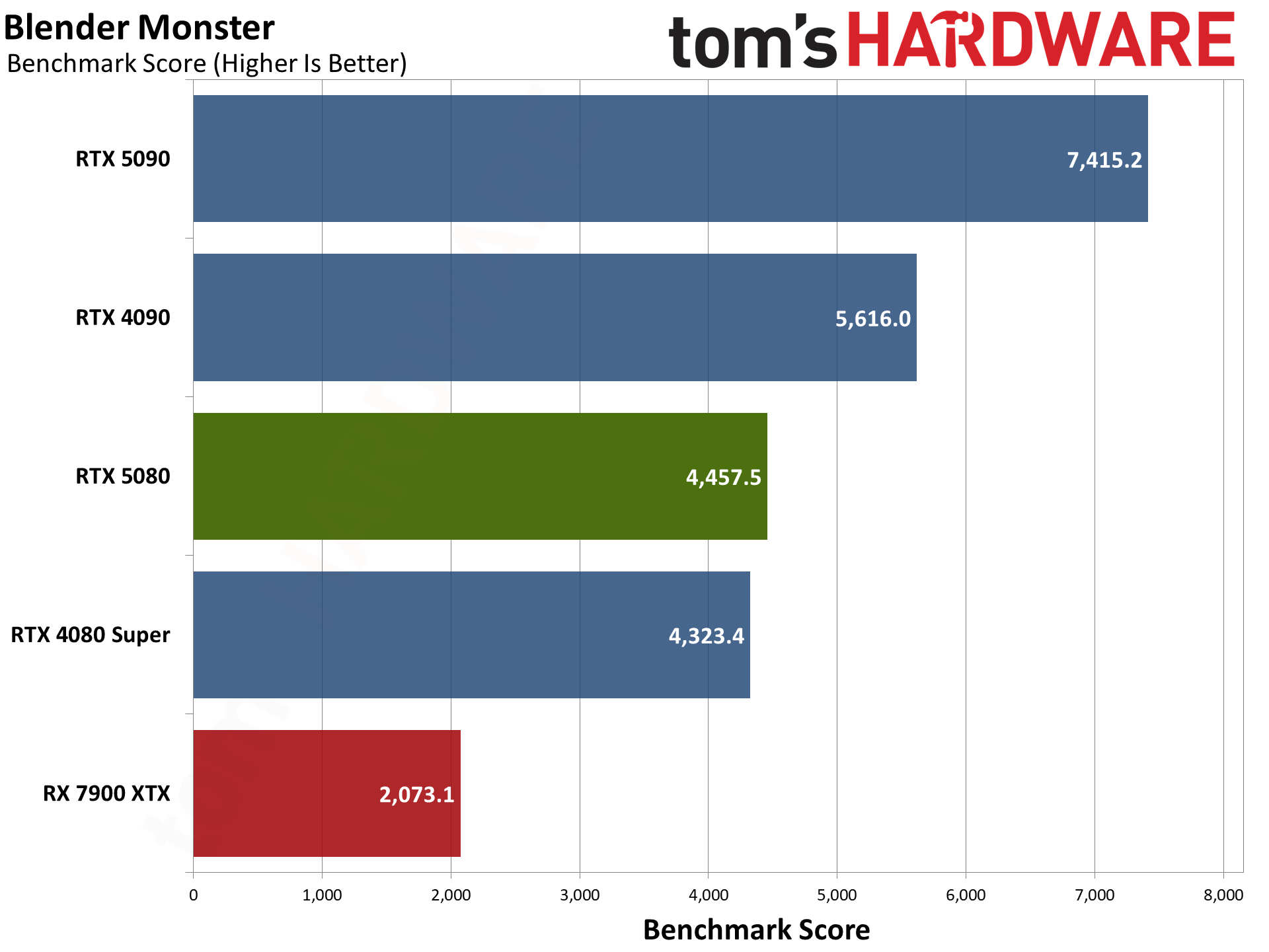
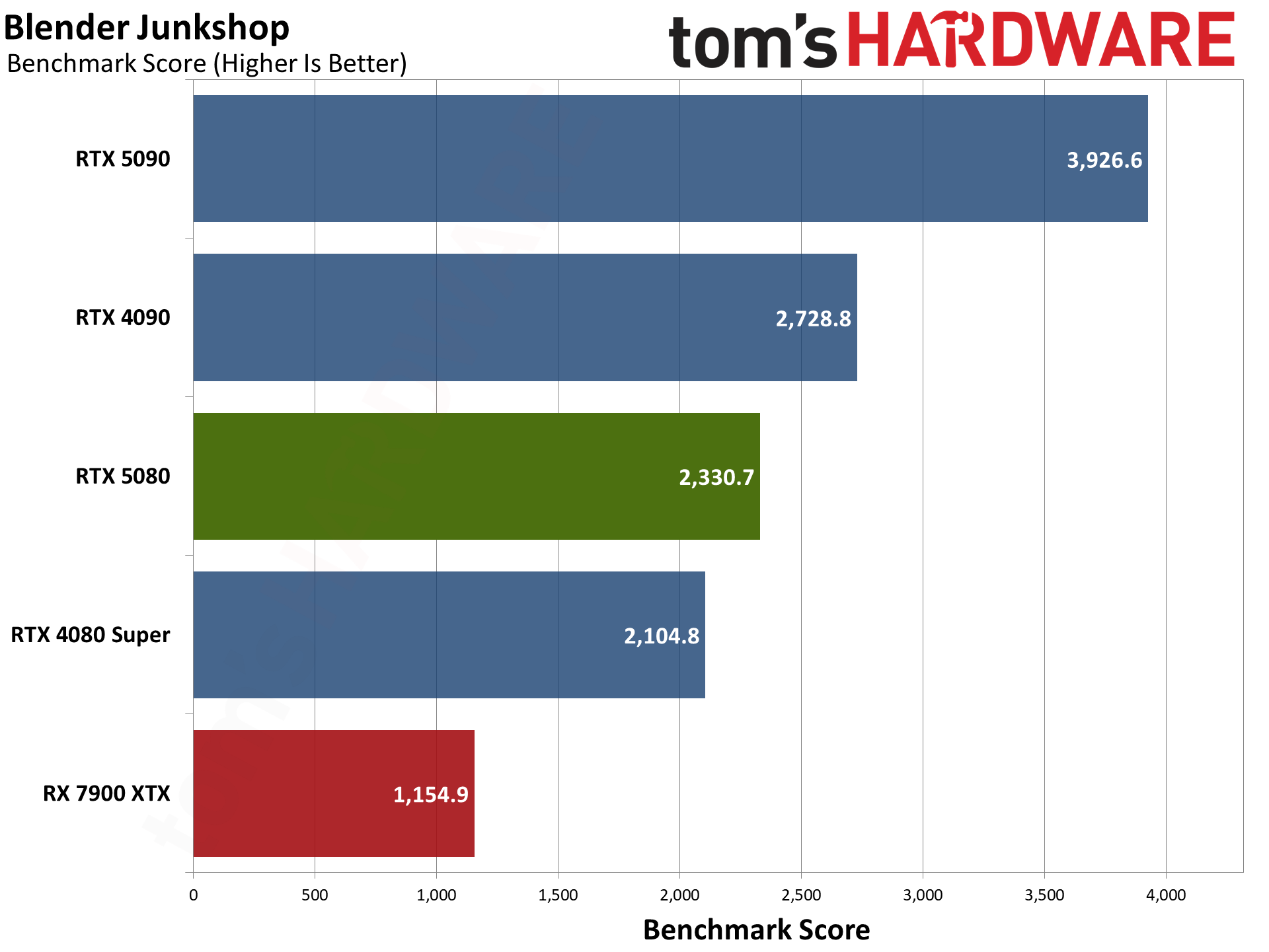
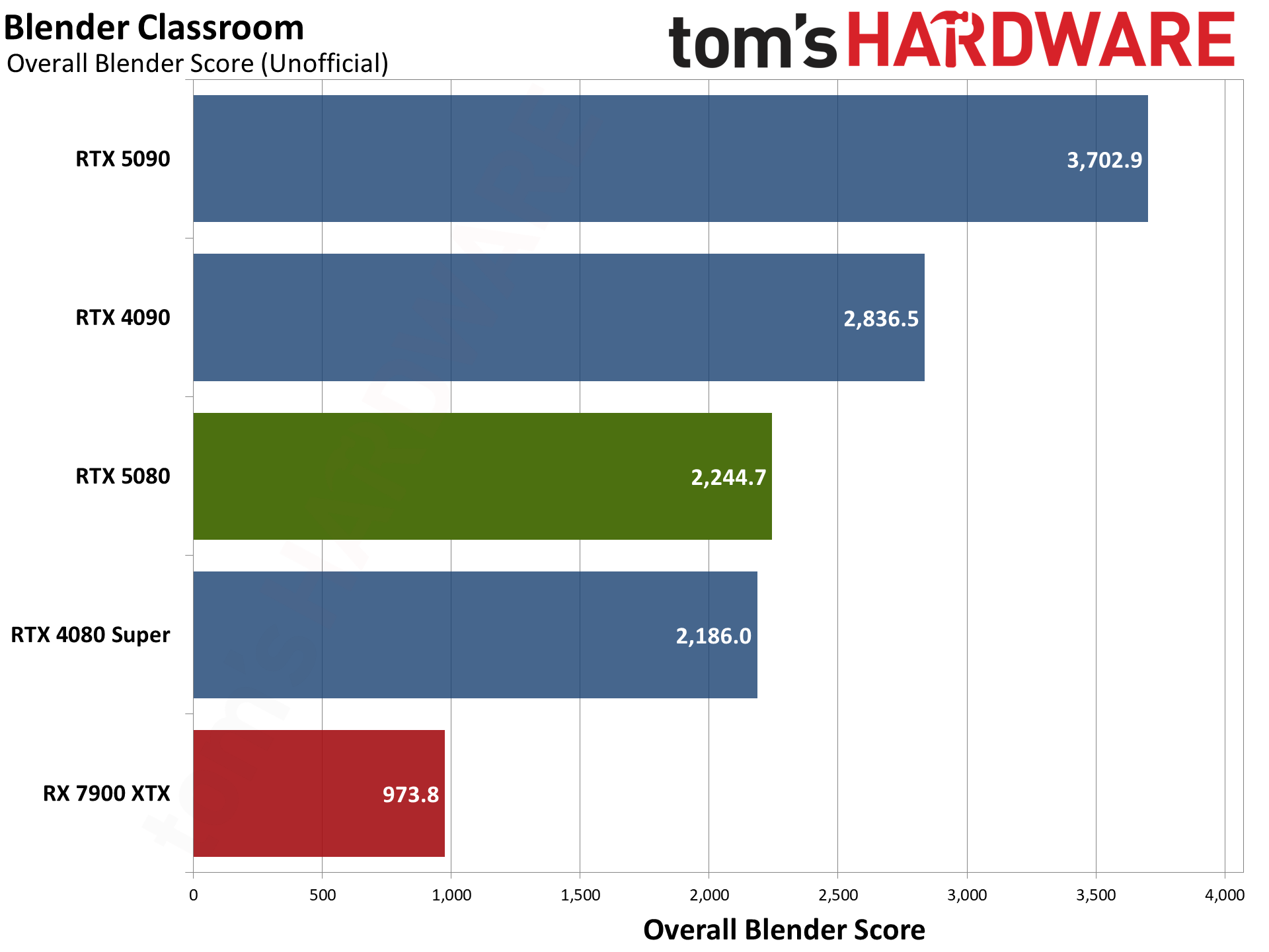
For our professional application tests, we'll start with Blender Benchmark 4.3.0, which has support for Nvidia Optix, Intel OneAPI, and AMD HIP libraries. Those aren't necessarily equivalent in terms of the level of optimizations, but each represents the fastest way to run Blender on a particular GPU at present.
Blender showed some massive gains in performance on the 5090 compared to the 4090. The 5080 on the other hand only shows a minor improvement over the 4080 Super. Overall, it's just over 5% faster. The result seems to be based on compute more than bandwidth — the 5090 is 35% faster than the 4090, and it has 27% more theoretical compute (with real-world clock speeds potentially giving it several percent more performance).
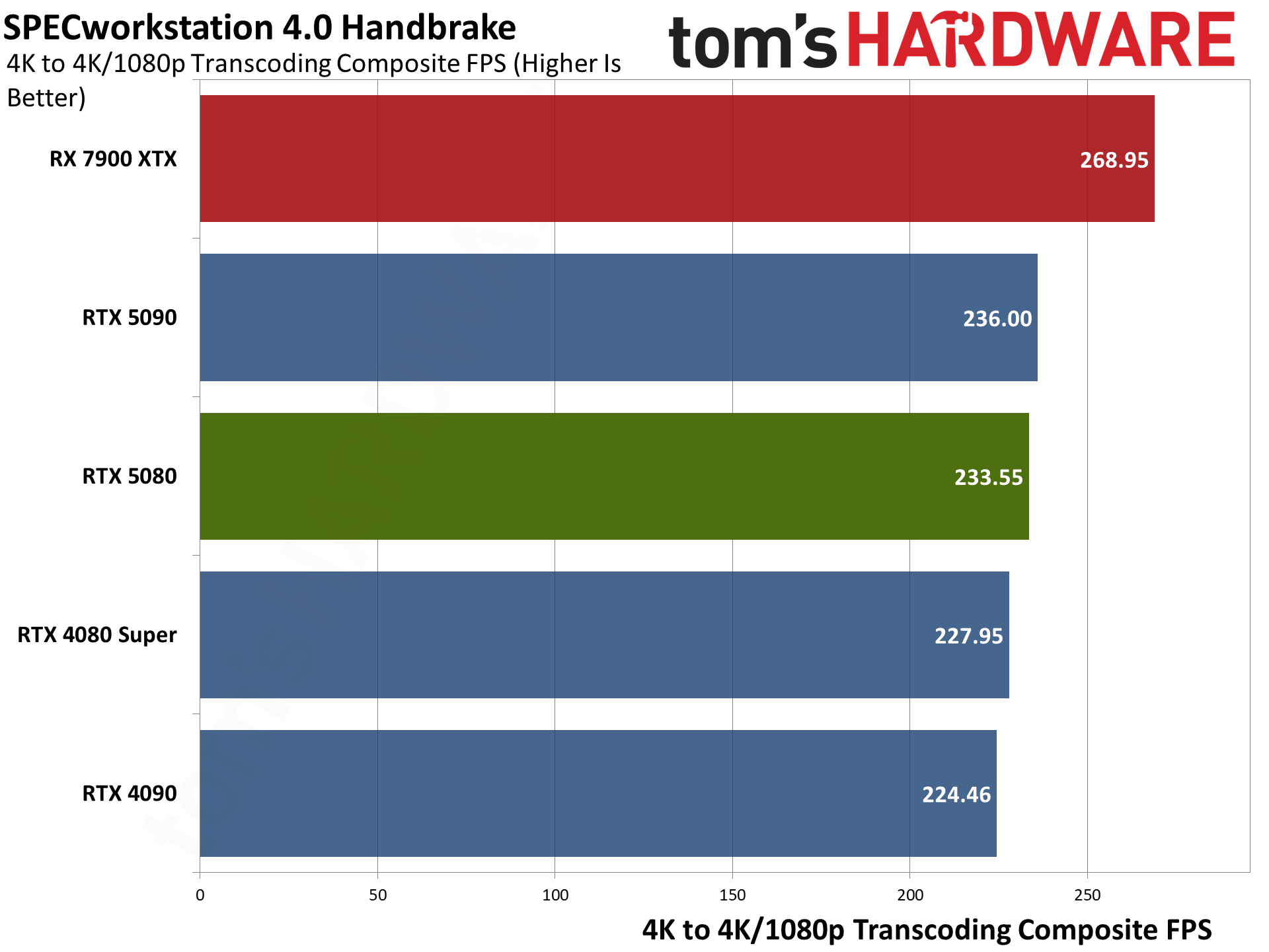
SPECworkstation 4.0 has two other test suites that are of interest in terms of GPU performance. The first is the video transcoding test using HandBrake, a measure of the video engines on the different GPUs and something that can be useful for content creation work. We use the average of the 4K to 4K and 4K to 1080p scores. Note that this only evaluates speed of encoding, not image fidelity.
The 5090 and 5080 have the same video encoding capabilities, so it's no surprise that they have basically the same result. The same goes for the 4090 and 4080 Super — the 4080 Super is clocked higher and thus does slightly better. AMD's results are faster, though quality in our previous GPU encoding testing was clearly lower. (Yes, we need to revisit that; just add it to the list of things to get done, please.)
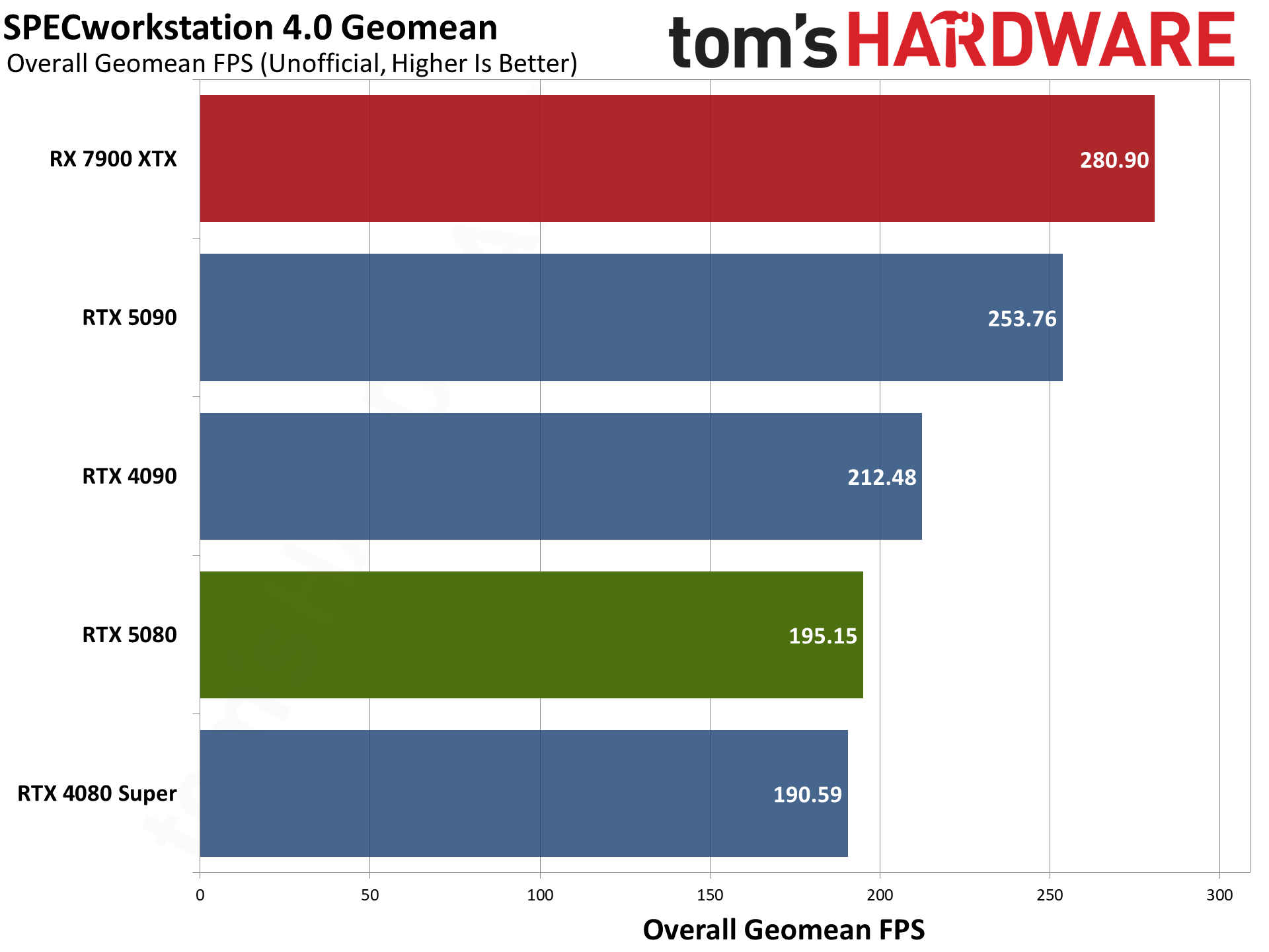
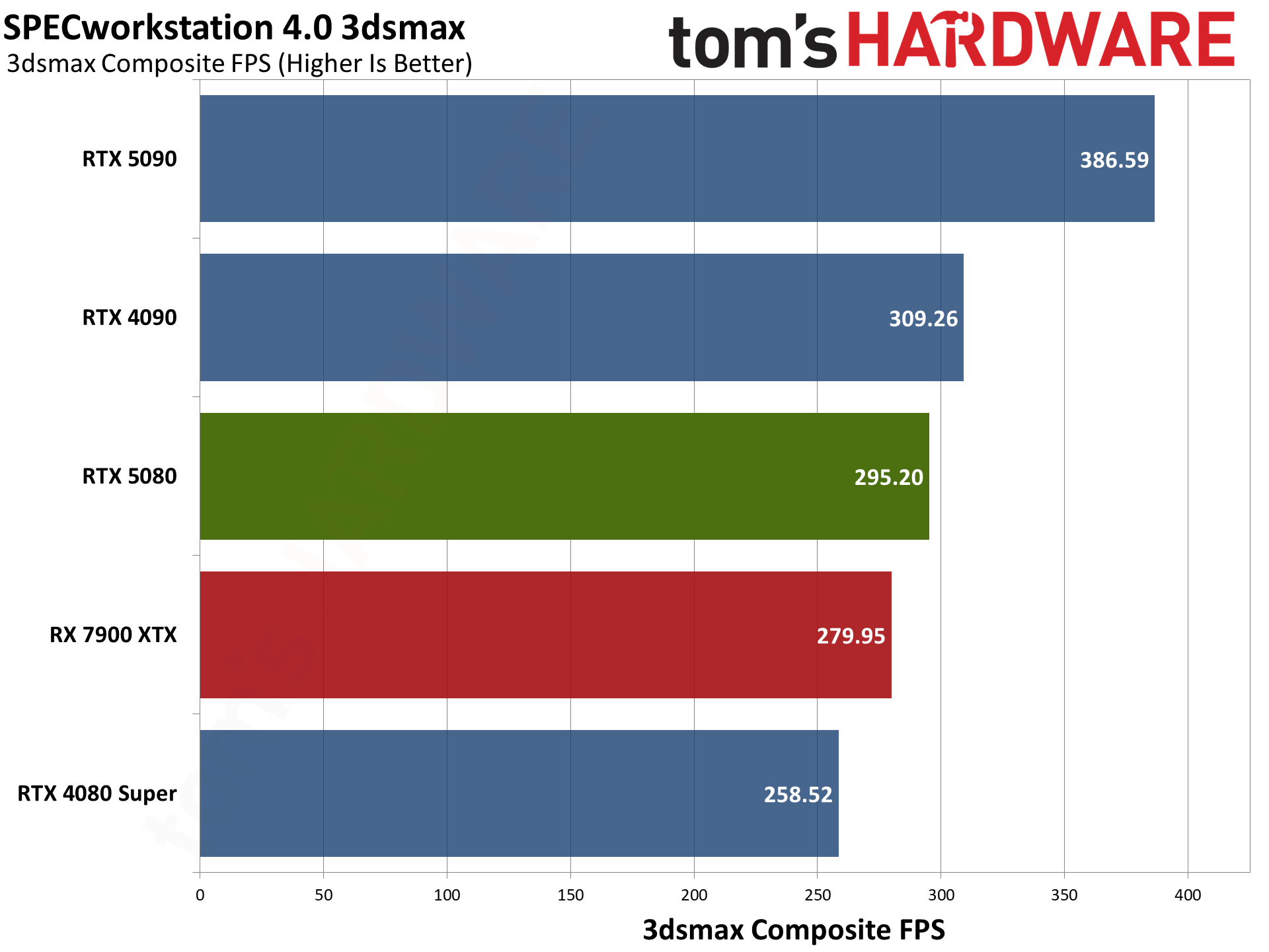
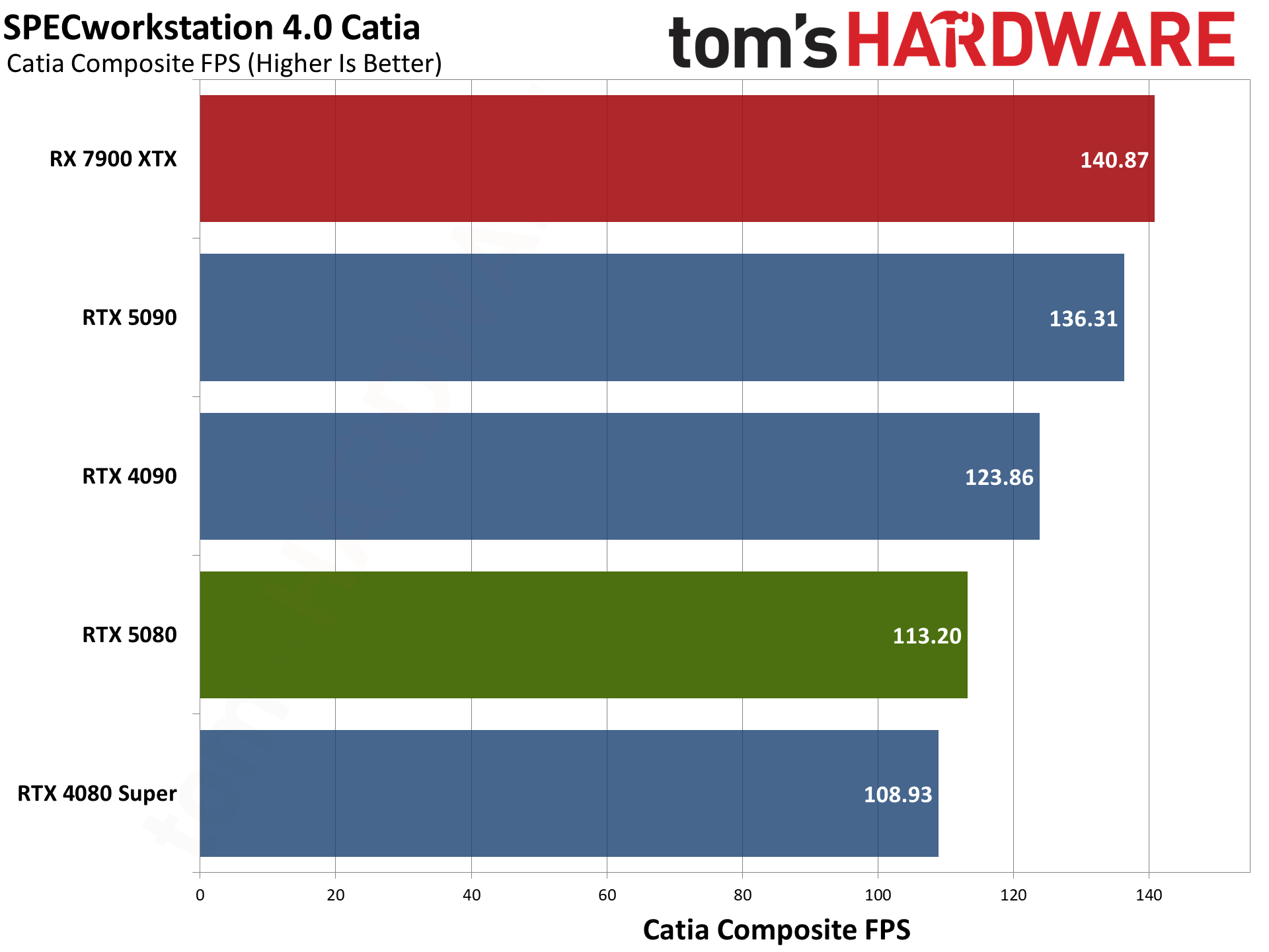
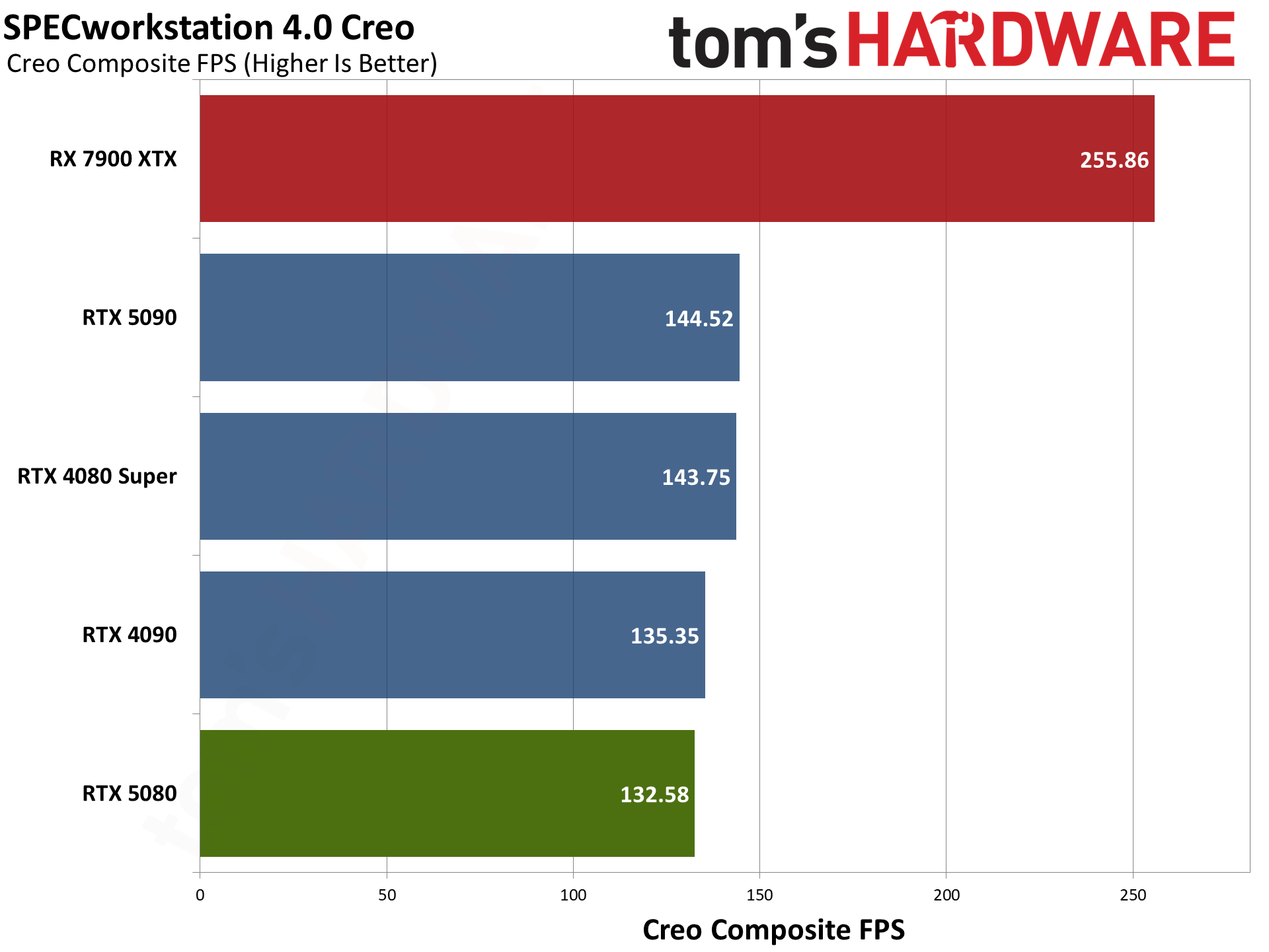
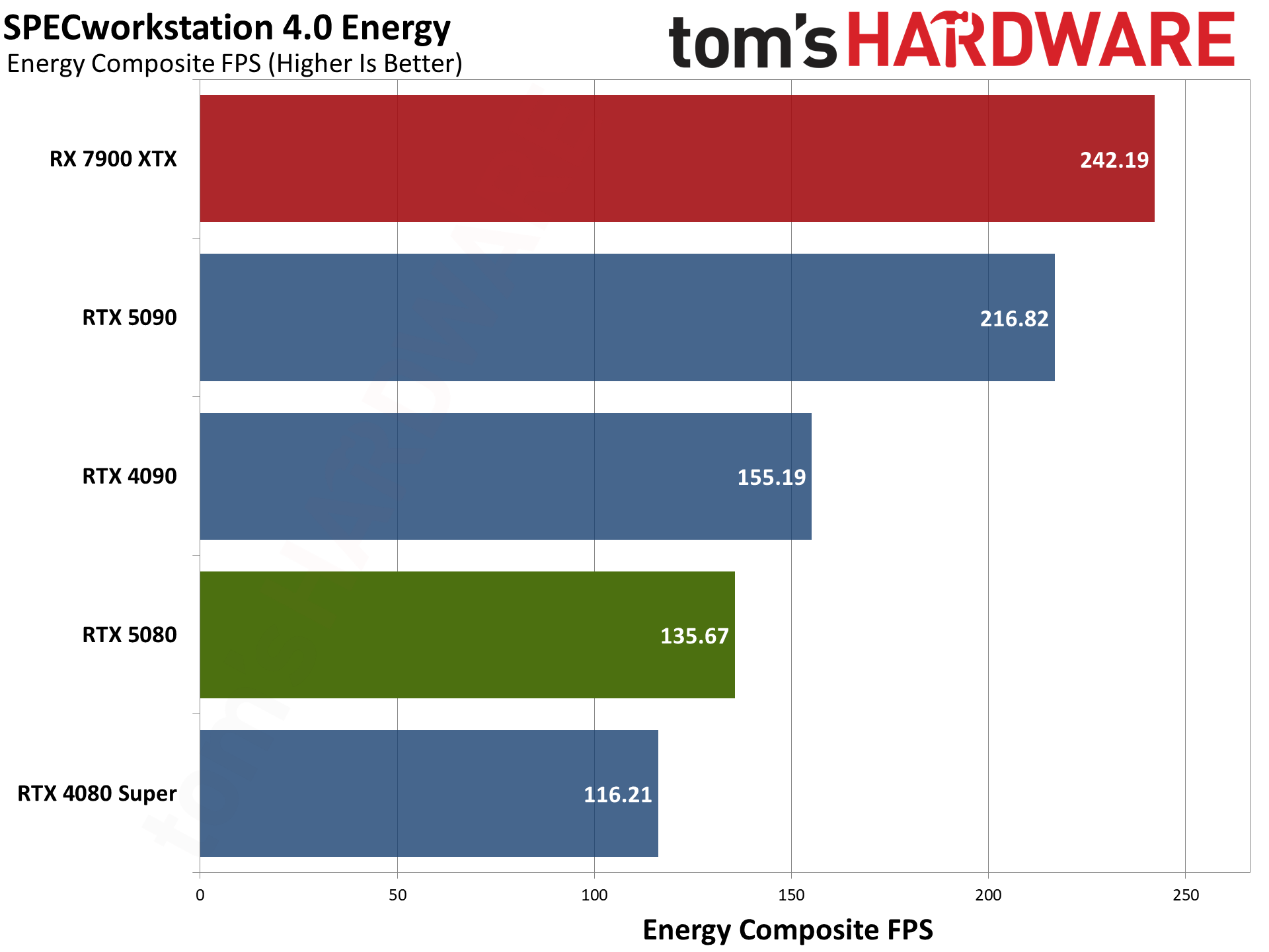
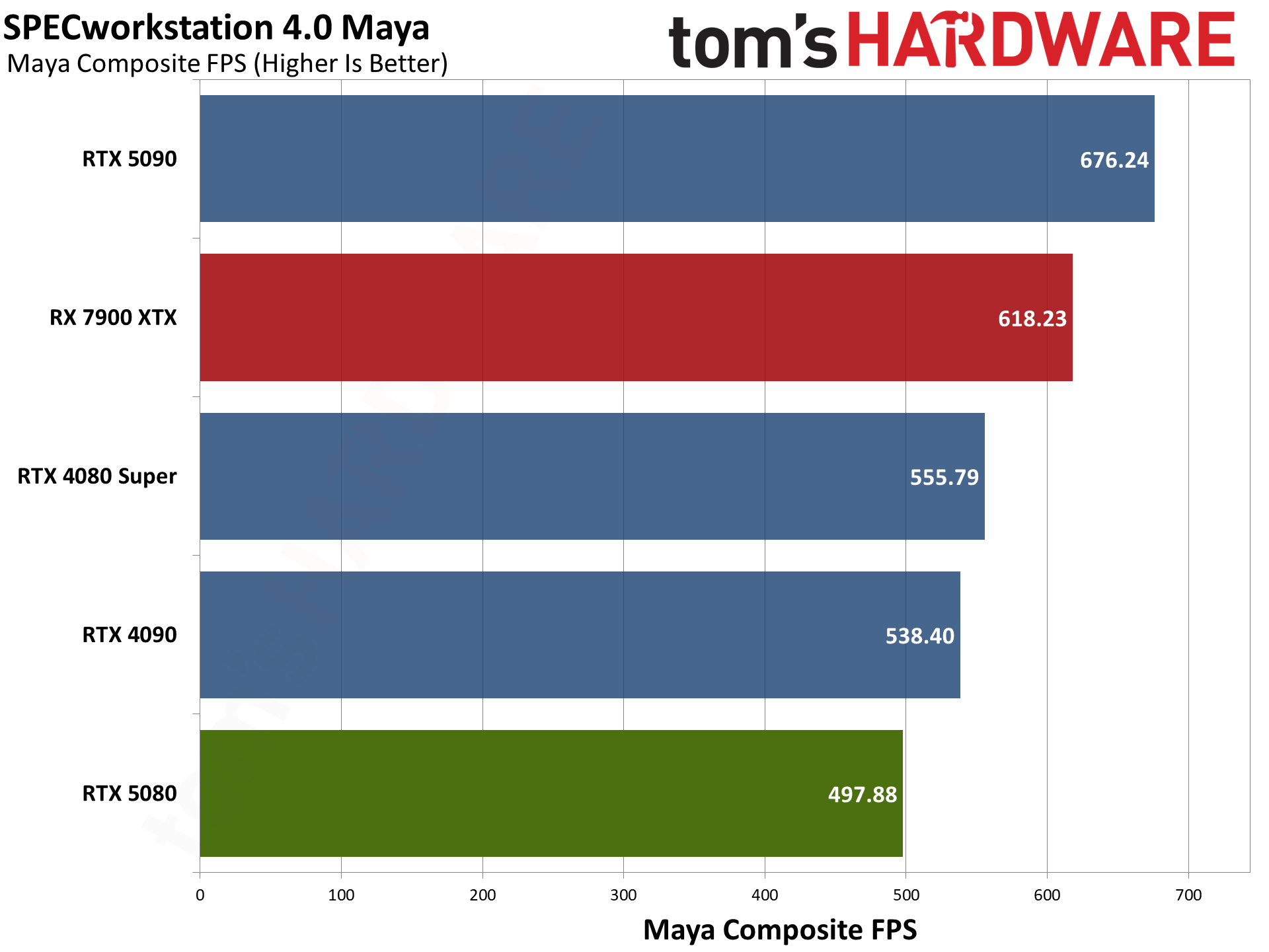
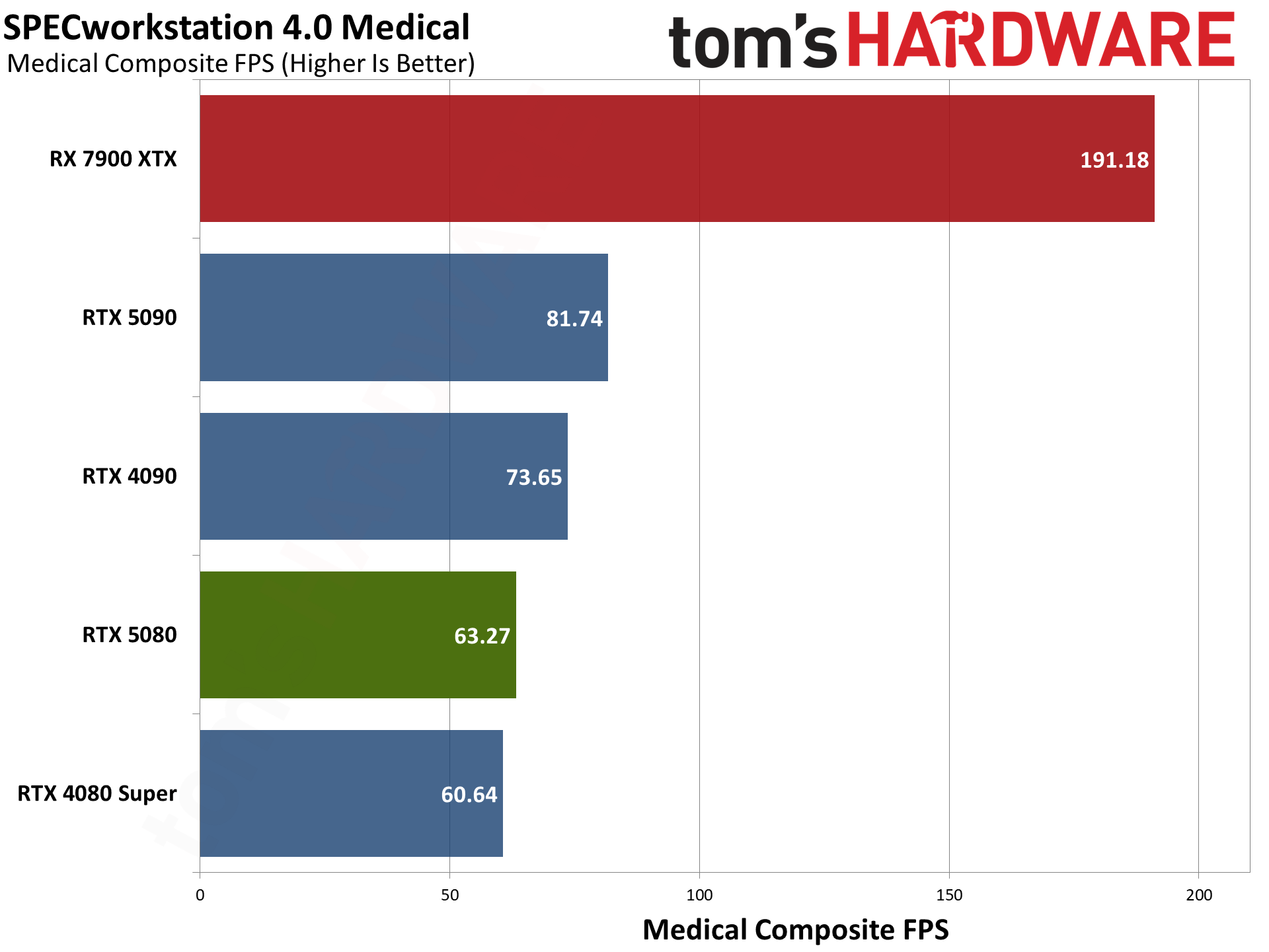
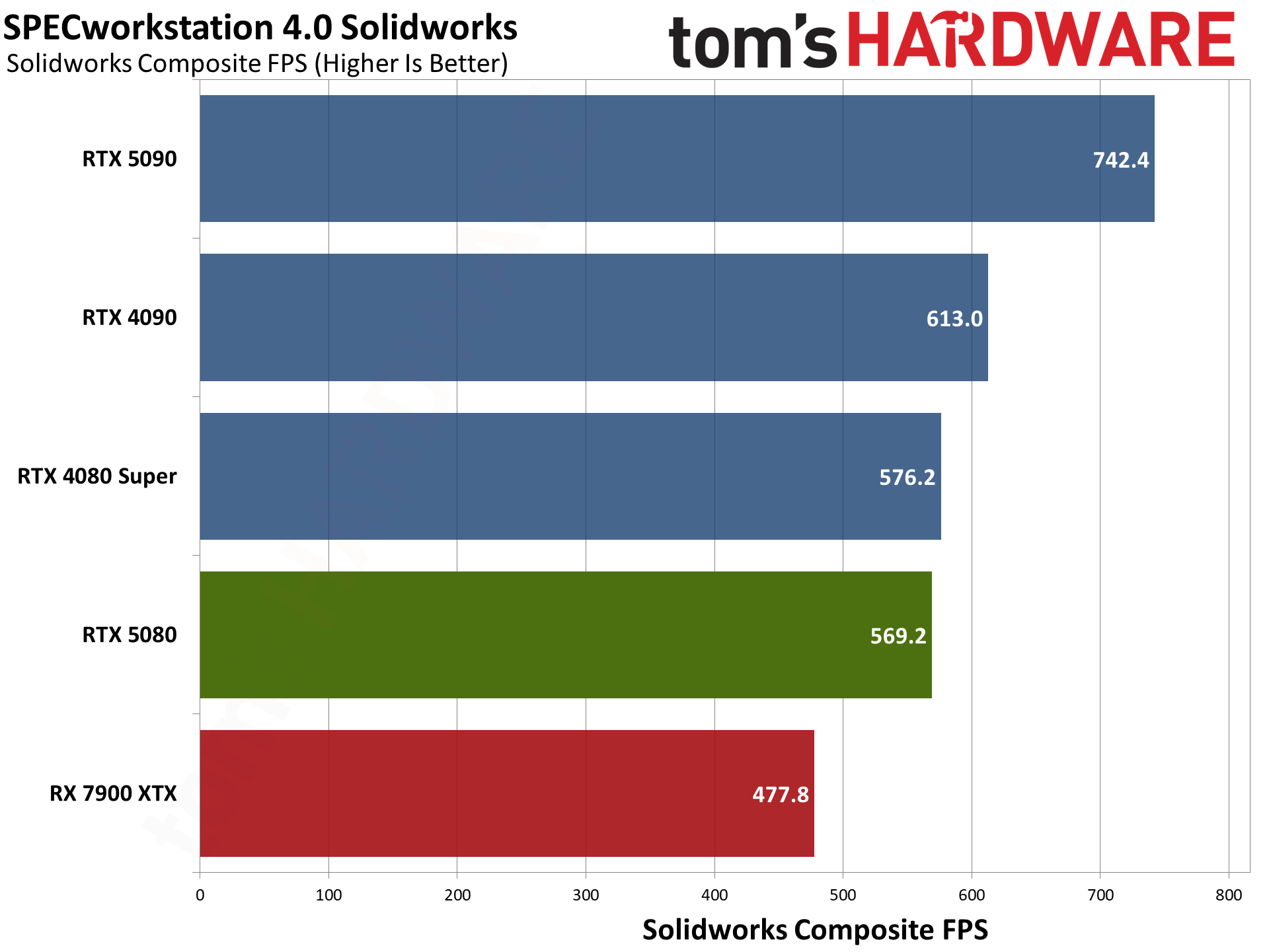
Our final professional app tests consist of SPECworkstation 4.0's viewport graphics suite. This is basically the same tests as SPECviewperf 2020, only updated to the latest versions. (Also, Siemen's NX isn't part of the suite now.) There are seven individual application tests, and we've combined the scores from each into an unofficial overall score using a geometric mean.
AMD's drivers for its consumer cards tend to be more friendly toward these professional applications, leading to higher overall performance. The 5080 trades blows with the 4080 Super in these tests, with some favoring the 5080 and others favoring the 4080 Super.
Get Tom's Hardware's best news and in-depth reviews, straight to your inbox.
- MORE: Best Graphics Cards
- MORE: GPU Benchmarks and Hierarchy
- MORE: All Graphics Content
Current page: Nvidia RTX 5080: Content Creation, Professional Apps, and AI
Prev Page Nvidia RTX 5080 Full RT and DLSS 4 Testing Next Page Nvidia RTX 5080: Power, Clocks, Temps, and Noise
Jarred Walton is a senior editor at Tom's Hardware focusing on everything GPU. He has been working as a tech journalist since 2004, writing for AnandTech, Maximum PC, and PC Gamer. From the first S3 Virge '3D decelerators' to today's GPUs, Jarred keeps up with all the latest graphics trends and is the one to ask about game performance.
-
cknobman Pretty darn dissapointing.Reply
Sit back and let the impatient suckers get fleeced.
I'll happily wait for March and see if AMD can offer something worth buying at $500. -
King_V I initially looked at the TDP numbers, and thought: a new architecture, slightly more than 10% extra power draw for slightly less than 10% extra performance, on average, for gaming.Reply
But, that it actually doesn't exceed the power consumption during use of the 4080 Super is nice to see.
Still, yeah, if you're in the market for a GPU with this performance, and if the price is the same, the 5080 is the way to go.
But, I feel like the odds are that, at least for a few months, the 5080 will cost more, and the 4080 Super prices MIGHT come down a little with the release of the 5000 series. If so, that situation could make the 5080 a hard sell. -
spongiemaster Reply
5090 is more than 50% faster than 5080 which is ridiculous. There's something to be said for trying to upsell, but that's way too big a gap in performance and cost between the 5080 and 5090. Also sounds like there are issues with volume production as well. Getting people to move up doesn't work if you don't have product to sell them. If you're in the market for a 5080, wait for the refresh. Will likely have more VRAM and will hopefully gain some meaningful ground in performance.Gururu said:It's so cheap though, $1000 less than the 5090. -
TCA_ChinChin How is "second fastest GPU" a positive? Its not even true, the 4090 is the second fastest GPU. This is the worst 80 series release by Nvidia for a while now. Im pretty sure the last 4-5 generations of 80 series cards have outperformed the previous generation flagship (except the 2080 vs 1080ti which was also a quite disappointing generation).Reply -
Elusive Ruse Thank you @JarredWaltonGPU for the detailed review and pointing out the flaws of this underwhelming product. The 80 class is officially dead? I wish you had the time to include the 3090 as well so we could see how 4080 performed against it and in turn highlight the fact that the 5080 doesn’t even come close to the 4090.Reply
I was in the market for a 5080 but my excitement died down gradually with the leaks about its specs over the past few months and with the reviews out I’m definitely not planning to throw €1200+ at it. -
spongiemaster Reply
5080 is 50% faster than the 3090 at 4k. So a decent upgrade for 3090 users for less money than they spent on their 3090 though there is a memory downgrade. Still would recommend waiting for the refresh.Elusive Ruse said:I wish you had the time to include the 3090 as well so we could see how 4080 performed against it and in turn highlight the fact that the 5080 doesn’t even come close to the 4090. -
I'm getting the impression that the reason behind 5080 being so disappointing, is Nvidia trying to funnel consumers into buying the extremely inflated 5090.Reply
